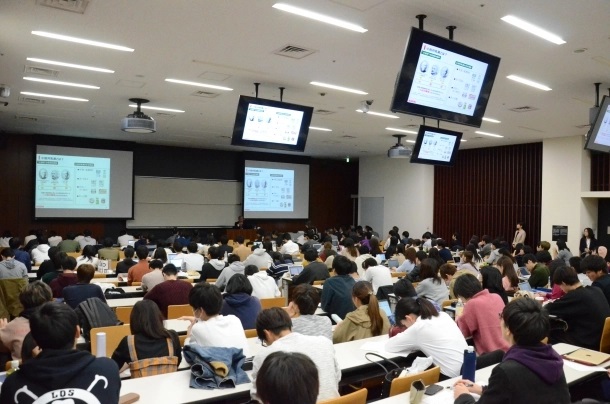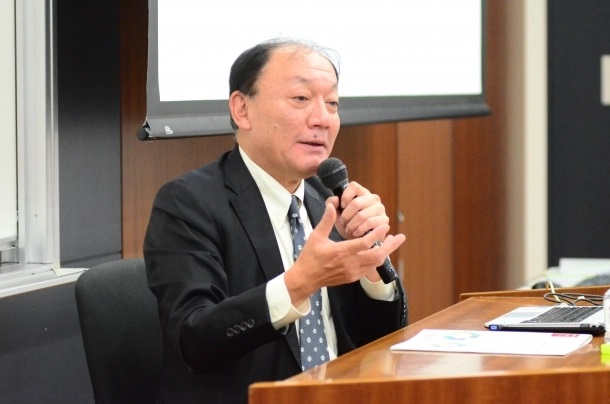Kirin’s Senior Executive Visits Waseda
Tue, Feb 4, 2020-
Tags
On November 20th, Takayuki Fuse, Senior Executive of Kirin Holdings Co. Ltd. since March 2019, gave a lecture at Waseda University. Mr. Fuse shared his insights into management and corporate leadership by weaving both personal and professional anecdotes to engage the audience, most of whom were students. The lecture was part of an effort by the university to invite alumni to share their experiences with current students. Mr. Fuse’s lecture touched on several topics including his personal philosophy, his company’s history and its growth.

Personal experiences can have a significant impact on how one becomes a company leader and what kind of leader the person becomes. Mr. Fuse recalled his time at Waseda as a learning experience, which he said would later help him professionally as well. “I learned a lot at Waseda, and my experiences have helped me work with others later in life, especially in the workplace,” he said. Although he admitted that he had not been particularly invested in academics as a student— he had spent most of his college days socializing with friends and playing Mahjong— he said college had taught him interpersonal skills. He told students to develop their emotional intelligence (EQ). Socializing was, in retrospect, a great way for him to learn about people and working with others, he said.
He rose through the company ranks and became the President and CEO. However, he did not support the traditional culture of hierarchy and seniority. He said he tries to work with employees from different positions, especially with new and younger colleagues. He showed pictures of him with his younger colleagues, including a recent college graduate. “People call me an empathetic leader,” he said. “It’s about the people.”
Mr. Fuse became Chair of Kirin Group’s Koiwai Dairy Products in 2010. The company, launched in 1976, has origins dating back to 1891 in the Koiwai Farm in Iwate prefecture. After the March 2011 earthquake that hit Japan’s northeast region, his company committed to serving customers in the disaster-hit areas, which included Iwate. Since established, it developed fermented butter in 1902 and launched the industry’s first kind of fermented yogurt in 1984, according to the company. To this day, the company sells the “Koiwai Namanyu 100% Yogurt,” which was Japan’s first “prefermented manufacturing first premium yogurt.” This was considered innovative because previously, the prefermentation process had only been used to produce “drinkable yogurt”; however, the company applied this process to plain yogurt as well. Mr. Fuse said most of the dairy industry barely makes profit off milk; companies make profit by selling other dairy products such as yogurt, cheese and butter. Eventually, because his company concentrated on customer’s needs and preferences, the revenue increased by 130%, which boosted employee motivation as well. He said that the company’s motto is to put “customer’s first.” He focused on production based on customers’ preferences.
Leadership and management are no mean feats; however, He showed the audience a news-paper article that reported on the “failure” of Kirin Beer, adding that he felt kuyashii— both frustrated and humiliated. In the first year as the branch chair of Osaka, I could not produce ideal results. At the end of the first year, I spoke with all the branch employees and apologized to them.
Mr. Fuse said mindsets can make a difference. However, he said this fueled him and his company to improve. Taking risks, being responsive to customer’s needs, and honestly discussing failures and successes can, in the long run, benefit companies. This approach applies not only to leaders, but also to employees. I felt that I could not repeat [the results of] the second year…” He decided to focus on a couple products and create a “new kind of beer that would make people happy.” He set a new goal for the second year: to have employees go around 123 stores a day. The young employees’ efforts infiltrated throughout the company as they influenced more senior employees; the company, as an organization, reached the same wavelength, which ultimately turned into unbelievable energy, he said. He recalled that the employees who had been set to retire, said to him, “I was able to do amazing work in the end.” “I felt firsthand that leadership is an amazing job because it can make people’s lives happier,” he said.
The innovations and progress continue. Kirin Brewery has changed its brand image several times, according to Mr. Fuse. His company now advertises its products with the Kirin Brewery logo on the center of its beer cans, which he said was unprecedented. The company established the Spring Valley Brewery across Japan, which serves the company’s craft beer to customers and gives tours to show the brewery, distinguishing its ambience from the izakayas— Japanese-style bars.
After Mr. Fuse’s lecture, several students raised their hands to ask questions. “Why do you prioritize people over money?” a student asked during the Q & A session. CEO Fuse responded that as a leader of a private company, making profits is a top priority. However, he said that to achieve the company’s goals, “working with people is important.” Another student asked about Kirin’s approach to climate change, and how it applies Corporate Social Responsibility to address it. At one point in the presentation, Mr. Fuse had touched on Kirin’s CSR initiatives, during which he dis-cussed his company’s role in recycling items. As a follow-up, a student asked him to specify Kirin’s sustainability initiatives and process— from production to recycling. “That’s a hard question to answer,” he said, adding that his company must align with the Sustainability Goals presented by the United Nations in 2015.
The purpose of such lectures was to expose and provide new opportunities for students. The courses are for students to not only learn theories but also use practical applications of business models and philosophies, thereby enhancing their understanding of business and commerce. The lecture host and Cainz CEO Tsuchiya said:
“Businesses including retailing become more intriguing the more
you learn about it. Unfortunately, we rarely have the opportunity
to appreciate its profoundness in everyday life. In our series of
sponsored lectures, we invite trailblazers from various fields to
share with you the fascination of the world of commerce. I hope
our lectures would not only introduce you to these great leaders,
but also help you explore and expand possible future career options.”
Mr. Fuse’s talk was informative and insightful because he not only discussed his company’s approaches to business, but also because he shared his personal philosophy that led him to his role. Personally, his talk emphasized the importance of balancing results and process. He taught me the importance of making the most of student life, both in and out of the classroom because our time now can lead to opportunities. It was a privilege to have been able to attend the event and gain in-sights into corporate leadership from a Waseda alum and CEO of a major Japanese company.
*This article was written and contributed by the following student.
Student Contributor
Marina Yoshimura (4th Year Student)
School of International Liberal Studies














